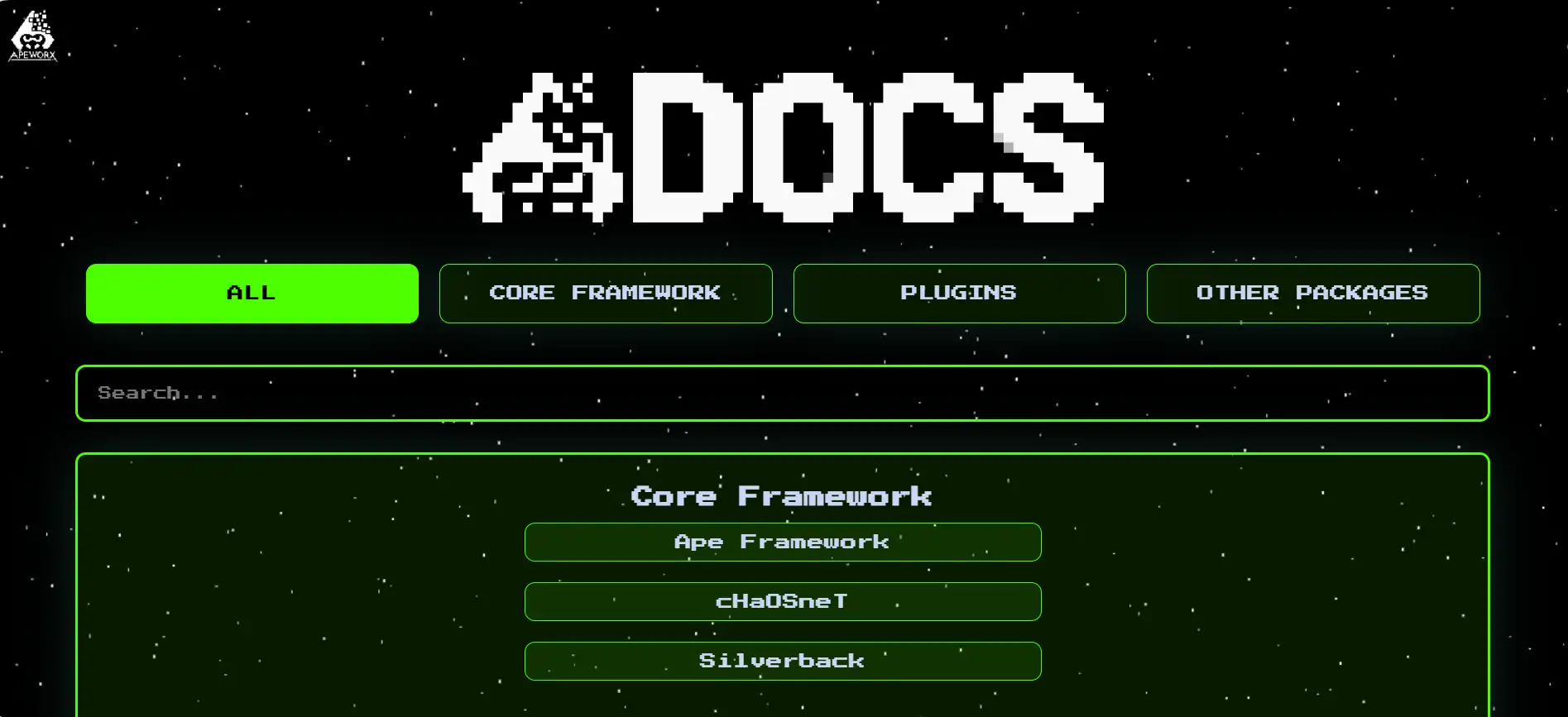About ApeWorx
ApeWorX is a pioneering Web3 developer tooling company that builds specialized infrastructure for smart contract engineers, researchers, and data scientists. Focused on enhancing blockchain development workflows, ApeWorX offers powerful tools such as Ape Framework and Silverback to streamline smart contract management and real-time on-chain automation. These tools are designed to work seamlessly across multiple blockchain networks, supporting an expansive plugin system for unmatched flexibility.
With a strong emphasis on open-source development, ApeWorX enables both individual developers and enterprise teams to create, test, deploy, and automate smart contracts using Python-native tooling. The modularity of the ecosystem ensures compatibility with EVM chains like Ethereum, Polygon, Arbitrum, and more, while offering plug-and-play integration with major platforms like Etherscan, Tenderly, Infura, and Alchemy. ApeWorX is redefining the standard for developer experience in decentralized engineering.
ApeWorX delivers a comprehensive and scalable toolkit for blockchain developers, combining extensive smart contract control with automation and observability features. At its core is the Ape Framework—a Python-based command-line interface and scripting environment for compiling, deploying, and testing smart contracts across chains. Designed with modularity in mind, Ape allows developers to customize their setup through a rich plugin system that includes support for Solidity, Vyper, Starknet, Base, Optimism, and more. Whether you’re auditing contracts, simulating forks, or deploying to testnets, Ape streamlines every aspect of the process.
Built by and for smart contract engineers, Ape offers full compatibility with tools like Foundry, Hardhat, Ganache, Ledger, and Trezor. Developers can also publish projects, analyze traces, and test edge cases via a native suite of utilities—all within a unified Python ecosystem. ApeWorX’s commitment to simplicity without sacrificing power has made it an essential framework for serious developers building in production environments.
One of the standout innovations from ApeWorX is Silverback, a Python-native bot framework for building automated agents that react to on-chain events. By leveraging Ape’s infrastructure and plugin ecosystem, Silverback enables developers to build real-time bots capable of monitoring smart contract activity, responding to new pool creations, detecting large swaps, or even automating liquidity provisioning. Silverback supports both local and cloud deployments, with Docker-based configuration that makes scaling these bots efficient and production-ready.
In addition to core tools, ApeWorX also offers advanced development capabilities such as ChaosNet, an experimental and permissionless staging network for live simulations and cross-network testing. Whether you're building a DeFi protocol, creating custom automation logic, or architecting scalable bots, ApeWorX provides the foundation for next-generation dApp development. With a vibrant developer community, open-source contributions, and multi-network plugin support, ApeWorX stands out in a competitive landscape that includes tools like Foundry and Hardhat.
ApeWorX offers a robust suite of features and benefits tailored for Web3 builders:
- Python-Native Smart Contract Development: Write, test, and deploy smart contracts using Python, giving engineers a modern and extensible toolset.
- Modular Plugin Architecture: Supports a wide range of chains and tools via plugins including Vyper, Solidity, Starknet, Infura, and Alchemy.
- Real-Time Automation with Silverback: Build and deploy on-chain bots that react to blockchain events using Python-based logic and containerized deployment.
- ChaosNet Integration: Run simulations and advanced testing in a permissionless, chaotic environment designed for stress testing smart contracts.
- Cross-Chain Compatibility: Operate across major EVM chains such as Ethereum, Polygon, Optimism, Arbitrum, Fantom, and more.
- Built-In Trace and Log Tools: Inspect transactions, identify reverts, and analyze contract behavior with built-in debugging support.
- Docker-Based Deployments: Run automated tests, bots, and development stacks using Docker, including pre-built images and slim containers for production.
- Extensive Documentation: Access in-depth developer guides, API references, CLI docs, and plugin tutorials via the official ApeWorX website.
ApeWorX provides an accessible path for developers to quickly install and use its tools across different operating systems:
-
Step 1: Install Ape
Use pipx, pip, or Docker to install Ape. Example: pip install eth-ape or docker pull ghcr.io/apeworx/ape:latest>. -
Step 2: Verify Installation
Run ape --version to confirm that Ape is successfully installed on your system. -
Step 3: Install Plugins
Add essential plugins for your environment, such as Solidity, Vyper, Tenderly, or specific network support like Arbitrum or Polygon. -
Step 4: Start a Project
Use the CLI to initialize your smart contract project. Compile, test, and deploy all from the terminal using Ape commands. -
Step 5: Explore Silverback
Install silverback via pip and begin building bots that listen to blockchain events. Example: silverback run example --network :mainnet:alchemy. -
Step 6: Join the Community
Engage with developers on Discord and follow project updates via ApeWorX.
ApeWorx FAQ
Ape Framework stands out by offering a Python-native CLI and scripting environment that integrates with a wide array of plugins and networks, allowing developers to use one unified tool for compiling, testing, and deploying contracts—unlike Hardhat or Foundry, which are JavaScript- or Rust-based and less modular in plugin extensibility; ApeWorX provides a more flexible experience tailored for full-stack Web3 teams.
Yes, Silverback supports the development and deployment of bots that listen to on-chain events across different EVM-compatible networks; using Ape’s plugin infrastructure and Docker-based deployment, developers can run bots that monitor or respond to events on chains like Ethereum, Arbitrum, Polygon, and others from a single interface—learn more at ApeWorX.
ApeWorX provides official plugins directly from its GitHub organization, and when installing third-party plugins, it displays a warning to notify users; this model offers maximum transparency while allowing developers to extend the framework cautiously—security-conscious users are advised to audit external plugins or stick to official ones listed at ApeWorX.
Absolutely. Ape Framework and Silverback can both be installed using
piporpipx, allowing local development without Docker, though Docker options are available for teams that prefer containerized environments—view full installation instructions at ApeWorX.ChaosNet is ApeWorX’s experimental, permissionless testing environment that simulates unpredictable network behavior, helping developers stress-test smart contracts in live-like conditions; it’s ideal for testing fail-safes, fallback logic, or monitoring tools before deploying on mainnet—explore its usage via ApeWorX.
You Might Also Like












